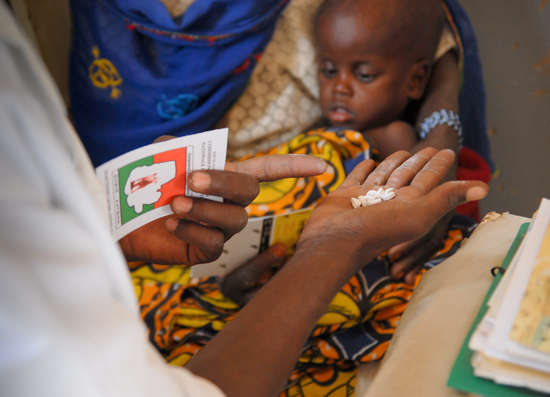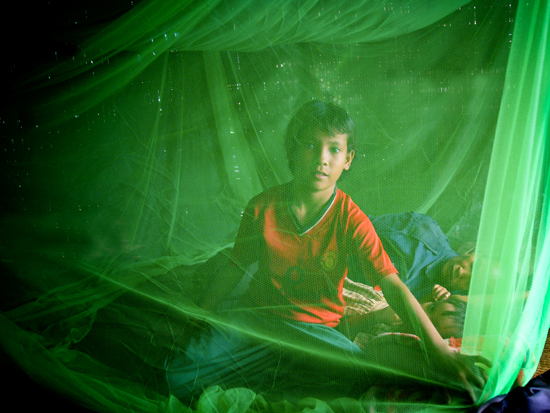By Sue Mbaya
Today is World Malaria Day. and more than sixty years ago some Americans might have marked the day by being sick -- perhaps very sick. Malaria causes high fevers, sweating and chills, and even brain damage and death. But malaria was eradicated in North America by 1950. So instead, U.S. communities are welcoming warmer weather now with little more than bottles of bug spray and a vague annoyance at the buzzing sounds of mosquitoes that come out at dusk.
Here in Africa, it's quite a different story. Our mosquitoes still kill.
More than nine out of ten malaria-related deaths happen in the region of the world where I live, sub-Saharan Africa. Malaria takes nearly one million lives a year, 85 percent of which are children. Mosquitoes and their deadly bites deliver a steady blow to millions of already struggling families, sapping their productivity and income, and snuffing out the next generation.
A doctor performs an evaluation of feverish Sadissou (age 4) to see if he has malaria.
Even as many African countries continue to make hard-earned economic progress, the financial toll of malaria remains a roadblock to these economies reaching their full potential. And with the global economic crisis already threatening to cut into Africa's gains, the effects of malaria should serve as a wake-up call to the international community.
All told, malaria costs Africa an estimated $12 billion in lost economic productivity each year, while consuming some 40 percent of government health expenditures in countries where it is endemic, according to UN and World Health Organization assessments.
The exhausting, debilitating symptoms of malaria keep hundreds of millions of adults from completing a full day's work, sometimes for weeks on end. Infected children often miss school and too many are burdened with long-lasting complications of anemia or brain damage, diminishing physical and mental productivity for years. For many, death is the ultimate outcome.
Those who don't know better sometimes refer to malaria as "Africa's common cold," only because millions battle it so frequently. But anyone who's been sick with this nasty ailment knows it's more like a frightening case of the flu.
Imagine if Americans had to perpetually battle an influenza strain that killed more than 2,000 children every day and gravely sickened millions of adults vital to the workforce. How much worse would the current economic downturn be in the United States? How much panic would there be among terrified parents? How overwhelmed would America's health care system be?
This unthinkable threat is the reality for hundreds of African communities battling malaria and its effects. For an African farmer, a malaria "sick day" means his children may not eat that day. For a poor entrepreneur who's too sick to take her goods to the market, it's lost income that could have paid for her children's school fees. For a mother constantly nursing diseased children back to health, it's lost opportunity to improve her family's economic situation.
Yet there's still good news on this World Malaria Day. This killer disease is preventable and treatable for a fraction of the $12 billion it robs from Africa's economic potential. A new report from World Vision this week confirms that the solution is simple--yet also shows that the solution must be rooted in the affected communities themselves.
In Yangon, Myanmar, Win will be able to sleep safely from the mosquitoes, which can give her malaria or dengue hemorrhagic fever.
Here is what it takes, according to experts: First, the all-important bed nets, combined with indoor spraying of insecticides, anti-malaria drugs and preventive medicine for pregnant women. The world community is making commendable progress on this front, with bold commitments to provide universal access to these items in endemic African countries by the end of 2010.
The second key to ending malaria is less dramatic, but no less important: In vulnerable areas, the local community has to be equipped to train and reinforce prevention practices and proper bed net use at the household level, as well as ensure availability of nets to the entire community. In fact, research has shown that bed nets need to cover everyone in a vulnerable community, not just the most vulnerable to malaria--children and pregnant women, for example. It's 80 percent or more coverage of everyone in one village that stops the deadly cycle of malaria.
Additionally, putting a stop to malaria isn't merely humanitarian goodwill, it's a smart investment in Africa's economic potential.
Many leaders in recent years have recognized this -- from Bill Gates to Bill Clinton, from George W. Bush to Barack Obama -- and it is encouraging to see this week's high-profile World Malaria Day events in Geneva, London and Washington as bright signposts declaring that the world's renewed commitment to stop malaria is continuing to gain momentum.
Meanwhile, the real milestones are happening this week in rural hamlets you've never heard of, in huts and cinderblock homes across Mozambique, Kenya, Senegal and Mali, where a mother hangs a bed net over her children for the first time. That's one more family that won't spend this Malaria Day being sick.
For more information on how you can get involved in the fight to help end malaria around the world, go to www.endmalaria.org.
Sue Mbaya is World Vision's Advocacy Director for Africa


